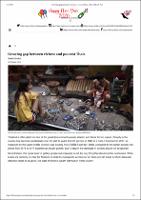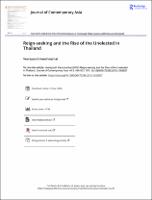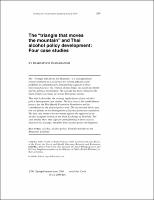Browsing by Subject "Thailand"
Now showing items 1-17 of 17
-
Achieving the targets for universal health coverage: how is Thailand monitoring progress?
(2019-04)
Universal health coverage (UHC) is one of the targets within the Sustainable Development Goalsthat the Member States of the United Nations have pledged to achieve by 2030. Target 3.8 has twomonitoring indicators: 3.8.1 for coverage of essential health services, for which a compound index from16 tracer indicators has recently been developed; and 3.8.2 for catastrophic expenditure on health.The global baseline monitoring of these two indicators in 2017 shows that the progress in many lowandmiddle-income countries is unlikely to be on track and ... -
The cost-effectiveness of improved brief interventions for tobacco cessation in Thailand
(2023-11-23)
Background: This study estimated the cost-effectiveness of four strategies enhancing the quality and accessibility of Brief Intervention (BI) service for smoking cessation in Thailand during 2022–2030: (1) current-BI (status quo), (2) the effective-training standard-BI, (3) the current-BI plus the village health volunteers (VHV) mobilization, and (4) the effective-training BI plus VHV mobilization. Methods: By interviewing five public health officers, nine healthcare professionals aiding these services, and fifteen BI service experts, we ... -
Equity of Social Health Insurance Coverage for Migrants in Thailand: A Concentration Index Analysis
(2021-12-22)
Thailand is attempting to implement an effective health insurance scheme to cover all migrant workers in the country. One of the remarkable policies is the Social Security Scheme (SSS). This study aims to assess the equity of SSS coverage among migrant workers in Thailand, sorted by types of businesses (agriculture, services and industrial sectors) and Gross Provincial Product (GPP) per capita. A secondary data analysis on time series cross-sectional data was employed. The dataset comprised: (1) the number of migrant insurees under the SSS; (2) ... -
Growing gap between richest and poorest Thais
(the ASEAN Post, 2019-10-25) -
Knowledge, Attitude, and Self-reported Practices on Prevention of Respiratory Infections among Two Groups of Islamic Pilgrims, Thailand, 2021
(2023-05-30)
Religious mass gatherings can foster contagious disease transmission in the home countries of pilgrims. Thailand has two major Muslim pilgrims: the Hajj and the Dawah. This study aimed to compare their knowledge (K), attitude (A), and self-reported practice (P), and qualitatively evaluate their perceptions regarding the prevention of respiratory infections. A cross-sectional mixed methods study was conducted. Multistage sampling was conducted in Hajj participants, while convenience sampling was used with the Dawah participants at two gathering ... -
Learning from pandemic responses: Informing a resilient and equitable health system recovery in Thailand
(2023-01-25)
This article is part of the Research Topic 'Health Systems Recovery in the Context of COVID-19 and Protracted Conflict'. The third quarter of 2022 saw COVID-19 cases and deaths in Thailand reduced significantly, and high levels of COVID-19 vaccine coverage. COVID-19 was declared an "endemic" disease, and economic activities resumed. This paper reviews pre-pandemic health systems capacity and identifies pandemic response strengths, weaknesses and lessons that guided resilient and equitable health system recovery. Robust health systems and adaptive ... -
Moving towards culturally competent health systems for migrants? Applying systems thinking in a qualitative study in Malaysia and Thailand
(2020-04-06)
Cultural competency describes interventions that aim to improve accessibility and effectiveness of health services for people from ethnic minority backgrounds. Interventions include interpreter services, migrant peer educators and health worker training to provide culturally competent care. Very few studies have focussed on cultural competency for migrant service use in Low- and Middle-Income Countries (LMIC). Migrants and refugees in Thailand and Malaysia report difficulties in accessing health systems and discrimination by service providers. ... -
Perceived Barriers of Accessing Healthcare among Migrant Workers in Thailand during the Coronavirus Disease 2019 (COVID-19) Pandemic: A Qualitative Study
(2023-05-10)
The outbreak of Coronavirus Disease 2019 (COVID-19) has threatened health and well-being in all populations. This impact is also deepening structural inequalities for migrant workers in Thailand. Due to their vulnerability and limited opportunity to access health services, they have greater risks in many health aspects compared to other populations. This qualitative study sought to examine the key health concerns and barriers during the COVID-19 pandemic on healthcare access among migrant workers in Thailand through the lens of policymakers, ... -
Political economy of Thailand's tax-financed universal coverage scheme
(2019-08-13)
Problem: The challenge of implementing contributory health insurance among populations in the informal sector was a barrier to achieving universal health coverage (UHC) in Thailand. Approach: UHC was a political manifesto of the 2001 election campaign. A contributory system was not a feasible option to honour the political commitment. Given Thailand’s fiscal capacity and the moderate amount of additional resources required, the government legislated to use general taxation as the sole source of financing for the universal coverage ... -
The Political Economy of UHC Reform in Thailand: Lessons for Low- and Middle-Income Countries
(2019-08-13)
Thailand achieved full population coverage of financial protection for health care in 2002 with successful implementation of the Universal Coverage Scheme (UCS). The three public health insurance schemes covered 98.5% of the population by 2015. Current evidence shows a high level of service coverage and financial risk protection and low level of unmet healthcare need, but the path toward UHC was not straightforward. Applying the Political Economy of UHC Reform Framework and the concept of path dependency, this study reviews how these factors ... -
Reign-seeking and the Rise of the Unelected in Thailand
(Journal of Contemporary Asia, 2016)
This article develops the concept of “reign-seeking” to capture the unprecedented collective action of the Thai professional and official elite prior to the 2014 military coup and the establishment of a military regime. It argues that this phenomenon reflects broad and deep political dynamics, for which the dominant scholarship on authoritarianism and Thai politics cannot adequately explain. The changing incentives of these supposedly non-partisan actors are interwoven with neo-liberal governance reform driven by a desire for depoliticisation and ... -
Risk Communication Distributed among Migrant Workers during the COVID-19 Crisis in Thailand: Analysis on Structural and Networking Gaps
(2022-10-12)
Language and cultural barriers among migrant workers hamper access to health risk information. This study aims to explore health risk communication structure and processes and identify the communication network of migrant workers during the COVID-19 pandemic in Thailand. This study used a parallel mixed-methods design combined with in-depth interviews and questionnaires for social network analysis from November 2020 to June 2021 in the headquarter district of Samut Sakhon, Ranong, and Phuket provinces. We conducted purposive sampling of representatives ... -
Self-assessment of attitudes towards conditions to provide safe abortion among new medical graduates in Thailand, 2018: an application of cross-sectional survey with factor analysis
(2021-07-21)
Background: Unsafe abortion is one of the major public health problems in Thailand. Although the penal code of Thailand and the Thai Medical Council permit doctors to perform safe abortion in certain conditions, little is known about the attitudes that new medical doctors have towards abortion. The objectives of this article are to explore the attitudes towards abortion in certain conditions among new medical graduates and to identify factors related to those attitudes. Methods: A cross-sectional survey was conducted in 2018 among 2017 medical ... -
Socio-demographic and geographic disparities of population-level food insecurity during the COVID-19 pandemic in Thailand
(2023-01-13)
Introduction: This study investigated the prevalence of food insecurity, and the association between socio-demographic and geographic factors and food insecurity in Thailand during the COVID-19 pandemic. Methods: The study extracted data on 5,066 persons age 15 years or older from a nationally-representative sample survey of Thai households, conducted during June-December 2021. The respondents were asked about food insecurity, socio-demographic characteristics, debt, and role of the primary household food provider. Binary logistic regression ... -
Strengthening the migrant-friendliness of Thai health services through interpretation and cultural mediation: a system analysis
(2020-12-08)
Background: In addition to healthcare entitlements, ‘migrant-friendly health services’ in Thailand include interpretation and cultural mediation services which aim to reduce language and cultural barriers between health personnel and migrants. Although the Thai Government started implementing these services in 2003, challenges in providing them still remain. This study aims to analyse the health system functions which support the interpretation and cultural mediation services of migrant health worker (MHW) and migrant health volunteer (MHV) ... -
The “Triangle That Moves the Mountain” and Thai Alcohol Policy Development: Four Case Studies
(Contemporary Drug Problems, 2009)
The “Triangle that Moves the Mountain” is a conceptualized strategy initiated as a social tool for solving difficult social problems, by simultaneously strengthening capacity in three interrelated sectors: (1) creation of knowledge; (2) social movement; and (3) political involvement. The concept has been claimed as the basis of many successes in various Thai policy arenas. This article describes the strategy implications of four alcohol policy development case studies. The first case is the establishment process for the Thai Health Promotion ... -
Utilisation of and factors associated with non-COVID-19 healthcare services in public facilities amongst cross-border migrants in Thailand, 2019-2022
(2024-01-09)
Background: It is believed that the COVID-19 pandemic might disrupt routine healthcare services. A vulnerable group such as cross-border migrants is of critical concern if the pandemic affects their service utilisation. In this study, we aim to explore the impact of COVID-19 and other related factors on non-COVID-19 service amongst cross-border migrants in Thailand. Methods: We conducted an ecological time-series cross-sectional analysis using secondary data from 2019 to 2022, focusing on insured and non-insured migrants in a unit of a provincial ...

















